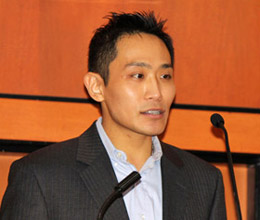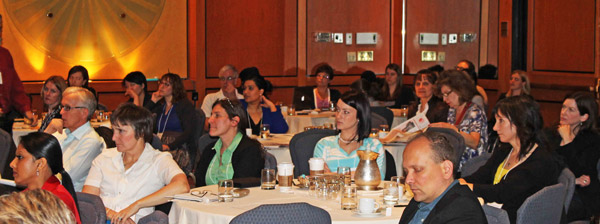Global health-law conference tackles ethics and issues
By Mark Witten
(May 23, 2012) Stem-cell tourism is a flourishing industry in which patients travel around the world to pursue unproven or untested stem cell treatments for an astonishing variety of illnesses. And it was one of the hot topics at the 2012 National Health Law Conference: Global Health Challenges and the Role of Law in early May, hosted by the CIHR Graduate Program in Health Law Ethics and Policy and the U of T Faculty of Law. Panelist Tim Caulfield described a form of medical tourism that costs patients an average of $20,000 to $50,000 U.S. per treatment, not including travel expenses.
“One clinic in Mexico claimed stem-cell therapies could cure Alzheimer’s, ALS, autism, diabetes, lupus, MS and aging,” said Caulfield, Canada Research Chair in Health Law and Policy, and University of Alberta professor.
Patients travel to clinics in more than a dozen countries--nearly half visit China and more than 25 percent go to Mexico, India, Germany and the Dominican Republic-- to receive treatments described on their websites as safe, routine and effective, despite the lack of scientific evidence for these claims. Clinics underemphasize the risks, although information is emerging about adverse events linked to stem-cell therapies including cancer, meningitis, lesions and death.
“One clinic in Mexico claimed stem-cell therapies could cure Alzheimer’s, ALS, autism, diabetes, lupus, MS and aging.”
Stem cell tourism is challenging to regulate because of its international, online, direct-to-consumer approach, so it’s important not to rely on legal mechanisms alone. Caulfield argued for the need to educate patients and provide the public with accurate information about stem-cell tourism, and a better understanding of the challenges involved in translating stem-cell research into safe and effective treatments.
What’s missing is good information, widely disseminated to balance the hype and hope in the media about the coming revolution in stem cell cures and coverage of clinics that’s “almost entirely positive or at best neutral,” said Caulfield.
There are also ethical issues to consider. I. Glenn Cohen described the problems resulting from kidney tourism for sellers in Pakistan, India and Bangladesh, and recipients in North America. “Pakistan is a large centre for transplant tourism, with over 2,000 kidneys sold each year and two-thirds going to foreigners,” said Cohen, associate professor, Harvard Law School and co-director of the bioethics Petrie-Flom Center.
Sellers in Pakistan were paid less than promised and 99 percent said their health wasn’t as good after the transplant. Many couldn’t work as long as before and 85 percent said their finances hadn’t improved. Recipients from the U.S. and Canada had a much higher incidence of acute rejection and much lower three-year survival rate than patients transplanted locally. Half of Canadian recipients in one study had serious post-transplant infections and two died due to fungal-related sepsis.
Cohen reviewed five bioethical arguments commonly raised against transplant tourism: corruption/commodification, crowding out, coercion, exploitation, and consent/paternalism. He found the first four hard to sustain and contended the best argument for intervention combines the premise that sellers do not give sufficiently informed consent(they’re deceived about the health risks and amount paid), with a form of paternalism, based on the fact most kidney sellers later regret their choices.
What’s the best way to prohibit transplant tourism? Cohen argued one effective deterrent would be for U.S. states to forbid insurers from reimbursing for immunosuppressive drugs or other transplant tourism related costs. He also suggested home countries could alter their existing prohibitions on organ sale and purchase so they apply to extraterritorial activities of citizens.
Has the rise in medical tourism improved or reduced access to health care for people in low- and middle-income destination countries?

Y.Y. Brandon Chen
That’s what U of T Faculty of Law graduate student Y.Y. Brandon Chen outlined in his arguments, looking at both sides of the debate. He presented work done with conference organizer and Faculty of Law Professor Colleen Flood, Canada Research Chair in Health Law and Policy.
Proponents of medical tourism contend destination countries benefit from inflow of currencies, return of expatriate medical practitioners, potential to cross-subsidize the public health-care system and trickle-down economics. Opponents argue it results in competition over limited resources, internal brain drain, rising health-care costs and profit-making trumps cross-subsidization goals.
What does the empirical evidence say? Chen observed that in Thailand, dramatic increases in the number of private sector physicians, and physicians resigned from public posts, point to an internal brain drain. In India, the government cut health-care spending as private health-care investment grew, with no net increase in health resources.
“We see destination countries investing in medical tourism. On balance, the direction of cross-subsidization is generally from public to private and there’s no evidence yet of benefits from trickle-down economics,” said Chen.
What is the role of law in addressing these concerns? Chen argued international collaboration is key to strengthening the capacity of public health-care systems in destination countries and meeting the challenges presented by medical tourism.
Here at home, Canadians are involved in a brisk transnational trade in human eggs that contravenes Canadian law. In her presentation on the new reproductive technologies panel, Jocelyn Downie cited various examples: 367 Canadians per year sent abroad by Canadian clinics to get eggs in the United States, Latin America, Europe and Asia; foreign nationals coming here to provide eggs at local fertility clinics; and Canadians importing frozen eggs from the U.S.
“What have Canadian authorities done about this? Nothing. They’ve failed to act,” said Downie, a professor in the law and medical faculties at Dalhousie University and Canada Research Chair in Health Law and Policy. The result is confusion, the dangers of underground practice for egg donors and recipients, and disregard and disrespect for the law.
These cross-border activities violate Canadian law in multiple ways: payment for eggs, payment for services, compensation for lost wages and inconvenience, and reimbursement above expenditures and without receipts.
Downie argued for the need to clarify, complete and enforce the law, calling on Health Canada to introduce regulations quickly. She also argued for implementation of social programs to reduce medical and social infertility, and promote altruistic donation of eggs.
The medical tourism and new reproductive technologies panels were two of many at the 2012 National Health Law Conference. In addition to the Faculty of Law and the Canadian Institutes of Health Research (the Institute of Health Services & Policy Research), sponsors included: Borden Ladner Gervais, the Centre for Innovation Law and Policy, Dykeman Dewhirst O’Brien, Fasken Martineau, Gowlings, UofT Dalla Lana School of Public Health, UofT School of Public Policy and Governance, and Blaney McMurtry.



